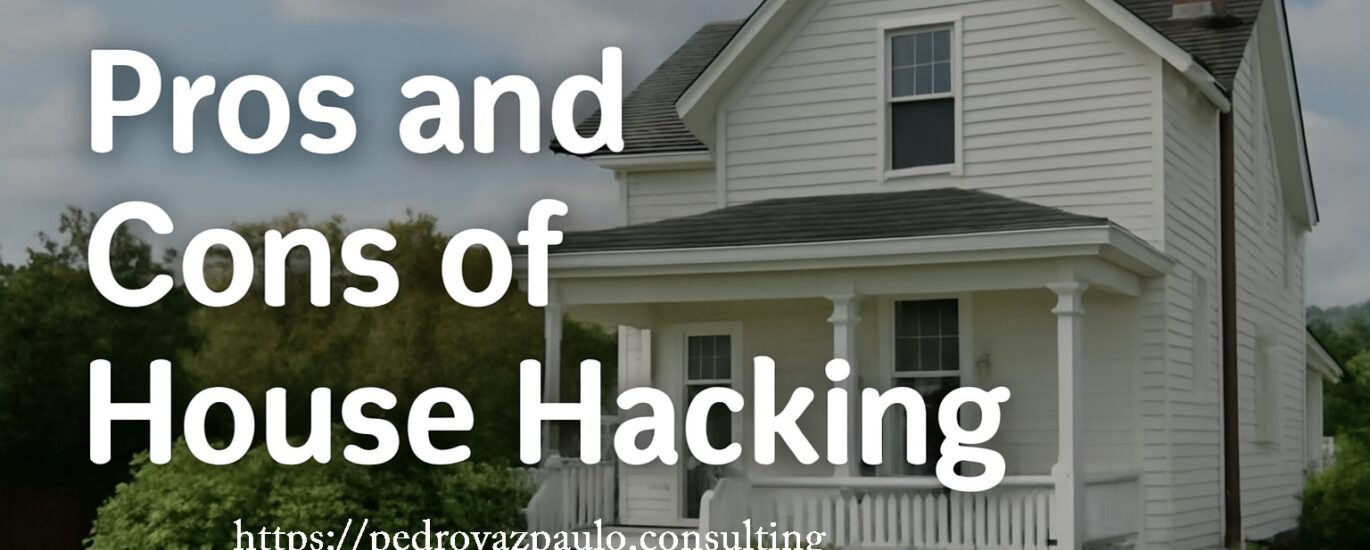If you’ve ever wondered how to ease your way into real estate investing without taking on huge financial risks, house hacking might be exactly what you’re looking for. By renting out part of your property, you can cover your mortgage, reduce living expenses, and start building equity—all while learning the ins and outs of real estate. For beginners, this strategy provides an accessible entry point into real estate investment, but like anything, it comes with its pros and cons.
House hacking isn’t just about living in a property and renting out a room. It can be an incredibly flexible strategy, whether you’re looking to rent out a single room, a basement, or even a multi-family home. This article will walk you through the benefits and drawbacks of house hacking for beginners, helping you decide if it’s the right investment strategy for you.
1. The Pros of House Hacking for Beginners
1.1 Low or No Monthly Mortgage Payments
One of the most attractive benefits of house hacking is the ability to significantly reduce your monthly mortgage payments or even eliminate them altogether. By renting out part of your property, you can generate rental income that offsets your mortgage and living expenses.
- Financial Freedom: Imagine living in a property without worrying about rent or a hefty mortgage payment. That’s exactly what house hacking offers. If you rent out a room or a separate unit, you can create a situation where your tenants are effectively paying your mortgage, and you’re living rent-free.
- Cash Flow: The income generated from renting out part of your home or property provides steady cash flow, which can be reinvested into further investments or used for repairs and improvements.
- Lower Living Costs: For beginners, this strategy helps cut down on your personal living costs, making it more affordable to own a property. The money you save can also go toward building your real estate portfolio or funding other investments.
1.2 Real Estate Experience and Portfolio Building
House hacking offers beginners a chance to enter the real estate market without the need to purchase multiple properties upfront. As a live-in landlord, you gain valuable experience in property management while simultaneously benefiting from the financial advantages.
- Tenant Management: You’ll gain hands-on experience in tenant management, including handling leases, maintaining relationships with tenants, and resolving issues that arise. This experience is critical if you want to scale your real estate investments in the future.
- Building Equity: While living in your property, you’re still building equity. As your tenants pay rent, you’re using their payments to pay down the mortgage, and the value of the property could appreciate over time. In essence, you’re benefiting from both cash flow and capital appreciation.
- Portfolio Growth: Once you’ve successfully managed one property, house hacking provides a stepping stone to acquiring more investment properties. The equity you build in your property, combined with the income from your tenants, can help you fund future investments.
1.3 Tax Benefits of House Hacking
Owning rental property comes with a variety of tax advantages, many of which house hackers can take advantage of. As a live-in landlord, you’re eligible for tax deductions and benefits that can significantly reduce your taxable income.
- Mortgage Interest Deduction: You can deduct the interest you pay on your mortgage, which is a significant savings for property owners. This is particularly beneficial in the early years of homeownership, where the mortgage interest is often higher than the principal payment.
- Property Tax Deductions: As a property owner, you can also deduct property taxes on your rental portion. If you’re renting out part of your home, you can deduct a proportion of the property taxes based on the square footage of the rented area.
- Depreciation: Pedrovazpaulo’s real estate strategies emphasize the importance of depreciation, which allows property owners to deduct a portion of the property’s value every year as it wears out. Even though the property might increase in value, you can still deduct this depreciation as a tax advantage.
1.4 Building Equity with Minimal Investment
For beginners, house hacking offers the chance to build equity faster than traditional homeownership. As you live in the property and make your mortgage payments, you’re gaining equity through the appreciation of the property and the payments made by your tenants.
- Faster Wealth Building: Since your tenants are essentially paying down the property’s mortgage, you’re building equity without having to put in a large down payment or pay a significant amount toward the mortgage each month.
- Capital Gains: If you choose to sell the property down the line, the equity you’ve built up can result in capital gains, especially if the property has appreciated in value over time.
2. The Cons of House Hacking for Beginners
2.1 Managing Tenants and Property Maintenance
While house hacking sounds great in theory, the reality of being a landlord can be more demanding than expected. Tenant management requires time and effort, and as a live-in landlord, you’re more directly involved in handling tenant issues and property maintenance.
- Tenant Issues: Handling tenant disputes, collecting rent, and addressing complaints can be time-consuming. Beginners might find the responsibility of managing tenants, particularly in the beginning, overwhelming.
- Ongoing Maintenance: Renting out part of your property means taking on the responsibility of maintaining those areas. This could include regular repairs, cleaning, and maintenance tasks. If you’re living in the property, these tasks can become more personal and potentially time-consuming.
- Property Wear and Tear: With tenants living in your home, it’s possible for the property to experience faster wear and tear. Keeping up with repairs and ensuring that the rental portion stays in good condition requires attention and commitment.
2.2 Lack of Privacy
One of the most significant drawbacks of house hacking, especially for beginners, is the loss of privacy. Renting out part of your home or property means sharing living space with tenants, which can lead to personal and emotional challenges.
- Shared Spaces: If you’re renting out a room or part of your home, shared spaces such as kitchens, bathrooms, and living areas can reduce your privacy and comfort.
- Boundary Issues: Even if you set clear expectations with tenants, the physical proximity of living with them can sometimes lead to uncomfortable situations. You may have to navigate personal interactions that feel intrusive.
2.3 Difficulty in Financing and Finding the Right Property
While house hacking provides an excellent way to enter real estate, finding the right property for it can be challenging. Not all homes or buildings are suitable for this strategy, and the financing process might be a hurdle for beginners.
- Property Type Limitations: Single-family homes may not offer the flexibility needed for house hacking unless you’re renting out individual rooms. Multi-family homes, on the other hand, can be a better fit, but they may require higher upfront costs or more substantial financing.
- Financing Options: For beginners, securing financing for an investment property—especially with little down payment or experience—can be a challenge. Traditional mortgage options might not be the best fit for house hackers unless they qualify for special loans like FHA loans or VA loans.
- Upfront Costs: Even if you use FHA loans or other low down payment programs, the upfront costs of house hacking can still be significant, particularly if you need to make renovations to make the space rentable.
2.4 Potential Impact on Property Value
Renting out part of your home can also impact the marketability and value of the property. For example, potential buyers may be less interested in a home with a rental unit attached, especially if it complicates the property layout or decreases privacy.
- Zoning Issues: Not all areas allow you to rent out parts of your home, and some may have strict zoning laws that restrict house hacking. It’s essential to research the local rental laws before committing to this strategy.
- Property Devaluation: In some cases, renting out part of your home can decrease its value. Potential buyers might not be interested in a property that has a rented section, reducing your ability to sell or refinance at the desired price.
3. How to Make House Hacking Work for You
3.1 Choosing the Right Property for House Hacking
- Multi-family Homes: These properties offer the best setup for house hacking, with separate entrances, kitchens, and living areas.
- Room Rentals in Single-Family Homes: If you have a single-family home, renting out rooms or basements can still work, but it requires more management and flexibility.
3.2 Financing Your House Hacking Investment
- FHA Loans: For first-time buyers, FHA loans are a fantastic option for financing multi-family properties with a low down payment.
- Traditional Financing and Private Money: If you’re looking for more flexible funding options, explore private lenders and hard money loans.
3.3 Managing Tenant Relationships
- Tenant Screening: Make sure to screen tenants carefully to ensure reliability and reduce potential problems.
- Clear Lease Agreements: Draft clear and concise lease agreements to avoid misunderstandings.
3.4 Understanding Legal and Tax Requirements
- Local Laws: Research and comply with local zoning laws and rental regulations before renting out part of your home.
- Tax Deductions: Take advantage of tax benefits such as mortgage interest deductions, depreciation, and property tax deductions.
4. Conclusion: Is House Hacking Right for You?
House hacking is an excellent strategy for beginners looking to enter real estate investing without taking on too much risk. It allows you to gain valuable experience, build equity, and generate cash flow, all while reducing living expenses. However, it’s important to weigh the pros and cons, especially considering factors like tenant management, privacy, and financing challenges.
If you’re up for the challenge and ready to start your real estate journey, house hacking could be a smart first step. Remember, the key to success lies in proper planning, tenant management, and understanding the financial implications.
Ready to dive into house hacking? Schedule a consultation today to learn how you can start using this strategy to build your real estate portfolio and achieve financial freedom. Let’s explore the best opportunities for you!











